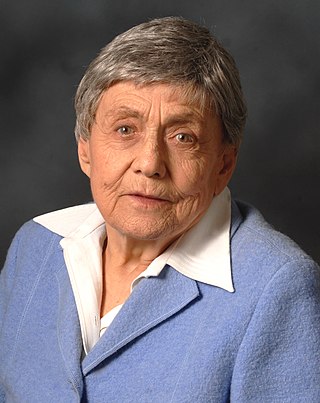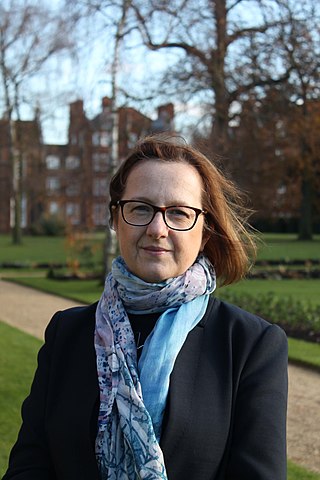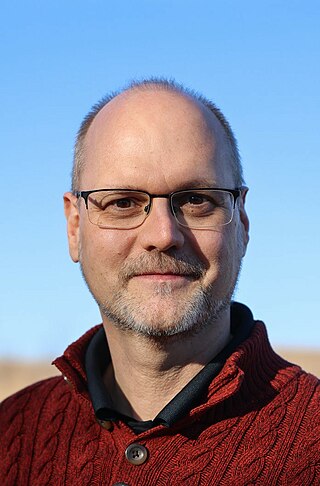Related Research Articles

Ruth Barcan Marcus was an American academic philosopher and logician best known for her work in modal and philosophical logic. She developed the first formal systems of quantified modal logic and in so doing introduced the schema or principle known as the Barcan formula. Marcus, who originally published as Ruth C. Barcan, was, as Don Garrett notes "one of the twentieth century's most important and influential philosopher-logicians". Timothy Williamson, in a 2008 celebration of Marcus' long career, states that many of her "main ideas are not just original, and clever, and beautiful, and fascinating, and influential, and way ahead of their time, but actually – I believe – true".
Conditional sentences are natural language sentences that express that one thing is contingent on something else, e.g. "If it rains, the picnic will be cancelled." They are so called because the impact of the main clause of the sentence is conditional on the dependent clause. A full conditional thus contains two clauses: a dependent clause called the antecedent, which expresses the condition, and a main clause called the consequent expressing the result.

Richard Merritt Montague was an American mathematician and philosopher who made contributions to mathematical logic and the philosophy of language. He is known for proposing Montague grammar to formalize the semantics of natural language. As a student of Alfred Tarski, he also contributed early developments to axiomatic set theory (ZFC). For the latter half of his life, he was a professor at the University of California, Los Angeles until his early death, believed to be a homicide, at age 40.

Hendrik Pieter (Henk) Barendregt is a Dutch logician, known for his work in lambda calculus and type theory.

Barbara Hall Partee is a Distinguished University Professor Emerita of Linguistics and Philosophy at the University of Massachusetts Amherst (UMass). She is known as a pioneer in the field of formal semantics.
Johannes Aldert "Jan" Bergstra is a Dutch computer scientist. His work has focussed on logic and the theoretical foundations of software engineering, especially on formal methods for system design. He is best known as an expert on algebraic methods for the specification of data and computational processes in general.
Jeroen Antonius Gerardus Groenendijk, was a Dutch logician, linguist and philosopher, working on the philosophy of language, formal semantics, pragmatics.

Katarzyna Malgorzata "Kasia" Jaszczolt is a Polish and British linguist and philosopher. She is currently Professor of Linguistics and Philosophy of Language at the University of Cambridge, and Professorial Fellow at Newnham College, Cambridge.

Benedikt Löwe (born 1972) is a German mathematician and logician working at the universities of Hamburg and Cambridge. He is known for his work on mathematical logic and the foundations of mathematics, as well as for initiating the interdisciplinary conference series Foundations of the Formal Sciences and Computability in Europe.
Mary Dalrymple is a British linguist who is professor of syntax at Oxford University. At Oxford, she is a fellow of Linacre College. Prior to that she was a lecturer in linguistics at King's College London, a senior member of the research staff at the Palo Alto Research Center in the Natural Language Theory and Technology group and a computer scientist at SRI International.
Semantics and Pragmatics is a peer-reviewed diamond open access academic journal covering research pertaining to meaning in natural language. A highly prestigious journal, it is one of the most important publication venues in formal semantics. It was established by David Beaver and Kai von Fintel in 2007 and has been published by the Linguistic Society of America since 2013. Its current editors-in-chief are Louise McNally and Kjell Johan Sæbø.
Sonja Smets is a Belgian and Dutch logician and epistemologist known for her work in belief revision and quantum logic. She is Professor of Logic and Epistemology at the University of Amsterdam, where she was the director of the Institute for Logic, Language and Computation (2016-2021) and is affiliated with both the Faculty of Science and the Department of Philosophy. She also holds a visiting professor position at the University of Bergen in Norway.

Pascal Hitzler is a German American computer scientist specializing in Semantic Web and Artificial Intelligence. He is endowed Lloyd T. Smith Creativity in Engineering Chair, one of the Directors of the Institute for Digital Agriculture and Advanced Analytics (ID3A) and Director of the Center for Artificial Intelligence and Data Science (CAIDS) at Kansas State University, and the founding Editor-in-Chief of the Semantic Web journal and the IOS Press book series Studies on the Semantic Web.
In formal semantics, a Hurford disjunction is a disjunction in which one of the disjuncts entails the other. The concept was first identified by British linguist James Hurford. The sentence "Mary is in the Netherlands or she is in Amsterdam" is an example of a Hurford disjunction since one cannot be in Amsterdam without being in the Netherlands. Other examples are shown below:
- #Tamina saw a Beatle or Paul McCartney.
- #The number I'm thinking of is divisible by 4 or it's even.
- #Is Wilbur a pig or an animal?
Alice Geraldine Baltina ter Meulen is a Dutch linguist, logician, and philosopher of language whose research topics include genericity in linguistics, intensional logic, generalized quantifiers, discourse representation theory, and the linguistic representation of time. She is a professor emerita at the University of Geneva.
In formal semantics conservativity is a proposed linguistic universal which states that any determiner must obey the equivalence . For instance, the English determiner "every" can be seen to be conservative by the equivalence of the following two sentences, schematized in generalized quantifier notation to the right.
- Every aardvark bites.
- Every aardvark is an aardvark that bites.
Mira Ariel is a professor of linguistics at Tel Aviv University, specializing in pragmatics. A pioneer of the study of information structure, she is best known for creating and developing Accessibility Theory.
Krzysztof R. Apt is a Polish computer scientist. He defended his PhD in mathematical logic in Warsaw, Poland in 1974. His research interests include program correctness and semantics, use of logic as a programming language, distributed computing, and game theory. Besides his own research, he has been heavily involved in service to the computing community, notably by promoting the use of logic in computer science and by advocating open access to scientific literature.
Mirjam Ernestus is professor of psycholinguistics and scientific director of the Centre for Language Studies at Radboud University Nijmegen in the Netherlands.
Catarina Dutilh Novaes is a Brazilian and Dutch philosopher whose research concerns the formalization of argumentation and reasoning in the history of logic and the philosophy of logic. She is a professor at Vrije Universiteit Amsterdam in the Netherlands, and a professorial fellow at the Arché philosophical research centre of the University of St Andrews in Scotland.
References
- 1 2 3 "Maria Aloni", Member profiles, Academia Europaea, retrieved 2022-03-31
- ↑ Birth year from German National Library catalog entry, retrieved 2022-03-31
- ↑ Aloni, Maria (2001), Quantification under Conceptual Covers (PDF) (PhD thesis), Institute for Logic, Language and Computation, retrieved 2022-03-31